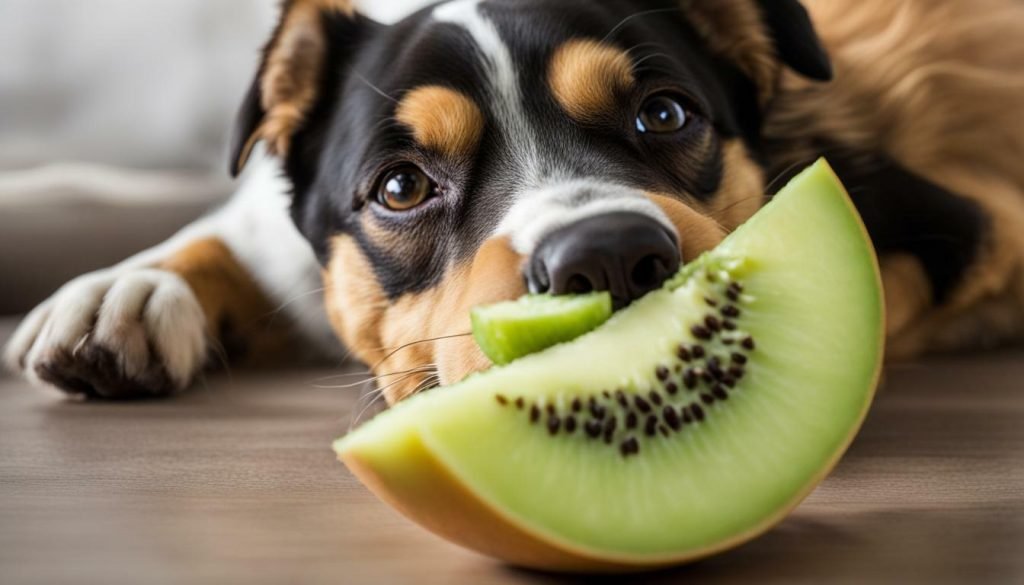
Honeydew melon is safe for dogs to eat in moderation. It is not toxic and can even provide some health benefits. Honeydew is a refreshing summer fruit that is high in water content, making it a great hydrating snack for dogs. It is also a good source of vitamin C, potassium, and dietary fiber.
However, it is important to remove the rind and seeds before feeding honeydew to dogs. The rind can be tough and difficult to digest, while the seeds pose a choking hazard. Feeding too much honeydew at once can lead to tummy troubles such as vomiting or diarrhea. It is recommended to consult a vet before giving honeydew to diabetic dogs, as it contains natural sugars.
As with all fruits and vegetables, honeydew should make up no more than 10% of a dog’s diet. Serve honeydew by cutting it into bite-sized pieces appropriate for the dog’s size or using a melon baller. On hot days, frozen honeydew chunks can be a refreshing treat. Overall, honeydew melon can be a tasty and healthy addition to a dog’s diet when fed in moderation.
Key Takeaways:
- Honeydew melon is safe for dogs to eat in moderation.
- It provides hydration and is a good source of vitamin C, potassium, and dietary fiber.
- Remove the rind and seeds before feeding honeydew to dogs.
- Feeding too much honeydew can cause digestive issues.
- Consult a vet before giving honeydew to diabetic dogs.
The Benefits of Honeydew Melon for Dogs
Honeydew melon offers several health benefits for dogs. It is a great source of hydration, especially during hot summer months. The high water content in honeydew melon can help keep your furry friend cool and prevent dehydration. Additionally, honeydew melon is rich in vitamin C, which supports your dog’s immune system and promotes overall health.
Another nutritional advantage of honeydew melon is its potassium content. Potassium plays a vital role in maintaining healthy muscle function and regulating blood pressure in dogs. By including honeydew melon in your dog’s diet, you can help support their cardiovascular health and prevent muscle weakness.
Furthermore, honeydew melon is a good source of dietary fiber. Fiber aids in digestion and can help regulate your dog’s bowel movements. By incorporating honeydew melon into their diet, you can promote healthy digestion and prevent constipation in your canine companion.

In summary, honeydew melon can provide numerous health benefits for dogs, including hydration, immune support, cardiovascular health, and digestion. It is important to feed honeydew melon to dogs in moderation and remove the rind and seeds. As with any new food, it is recommended to consult with your vet before introducing honeydew melon to your dog’s diet. This way, you can ensure that it is suitable for your dog and fits well into their overall nutritional needs.
Precautions Before Feeding Honeydew Melon to Dogs
Before feeding honeydew melon to your dog, there are a few precautions to keep in mind. While honeydew melon is generally safe for dogs, it is important to prepare it properly and introduce it slowly into their diet. This will help prevent any potential digestive issues or choking hazards.
1. Remove the Rind and Seeds: The melon’s rind can be tough and difficult for dogs to chew and digest. It is recommended to remove the rind completely before serving honeydew to your furry friend. Additionally, the seeds should be removed as they pose a choking hazard. Cutting the melon into small, bite-sized pieces will make it easier for your dog to eat and digest.
2. Limit the Amount: While honeydew melon can be a healthy treat, it should not make up a large portion of your dog’s diet. Fruits should generally make up no more than 10% of their overall food intake. Too much fruit can upset your dog’s stomach and lead to diarrhea or vomiting. It is important to maintain a balanced diet that includes all the necessary nutrients for your pet’s well-being.
3. Consider Your Dog’s Health: If your dog has any pre-existing health conditions, such as diabetes, it is essential to consult with your veterinarian before introducing honeydew melon into their diet. The natural sugars in honeydew melon can affect blood sugar levels, and proper portion control is crucial for diabetic dogs.

| Honeydew Melon Precautions for Dogs | |
|---|---|
| 1 | Remove the rind and seeds to prevent choking hazards. |
| 2 | Limit the amount of honeydew melon to no more than 10% of your dog’s diet. |
| 3 | Consult your vet before feeding honeydew melon to diabetic dogs. |
Moderation and Portion Control for Dogs
Just like any other fruit, honeydew melon should be given to dogs in moderation. While it offers numerous health benefits, it is important to remember that fruits should only make up a small portion of a dog’s diet. The rule of thumb is to ensure that fruits, including honeydew melon, make up no more than 10% of a dog’s overall food intake. This ensures that the dog receives a balanced diet that includes all the essential nutrients.
When feeding honeydew melon to your furry friend, it is essential to practice portion control. While dogs may enjoy the sweet taste, it is best to limit the amount of honeydew melon you give them. Too much fruit can upset their stomachs and lead to digestive issues, such as vomiting or diarrhea. It is always a good idea to introduce new foods gradually and monitor your dog’s reaction to avoid any adverse effects.
If you are unsure about how much honeydew melon to give your dog, consult your veterinarian. They can provide specific guidance based on your dog’s size, breed, and overall health. They may also recommend adjustments to portion sizes based on individual needs or dietary restrictions. Remember, every dog is unique, and what works for one may not work for another, so professional advice is crucial.
| Benefits | Precautions | Serving Suggestions |
|---|---|---|
|
|
|
Quick Tip:
If your dog has never had honeydew melon before, introduce it gradually and watch for any signs of digestive upset. It’s always better to be cautious when introducing new foods into your dog’s diet, even if they are generally safe for dogs.
By following moderation and portion control guidelines, you can safely incorporate honeydew melon into your dog’s diet and provide them with a tasty and healthy treat. Remember to always prioritize your dog’s overall nutritional needs and consult with a veterinarian for personalized advice.

There are different ways to serve honeydew melon to your furry friend. The first step is to choose a ripe honeydew melon. Look for a melon that feels heavy for its size and has a sweet aroma. Once you have the perfect melon, it’s time to prepare it for your dog.
The simplest way to serve honeydew melon is to cut it into bite-sized pieces. This makes it easier for your dog to eat and reduces the risk of choking. You can also use a melon baller to create small, round pieces of melon. These can be a fun and refreshing treat for your dog, especially on hot summer days. Remember to remove the rind and seeds before serving, as they can be tough and pose a choking hazard.

Another option is to freeze honeydew chunks. This turns them into a cool and crunchy snack that dogs love. Simply place the bite-sized pieces on a tray and freeze them until solid. Once frozen, you can store them in an airtight container in the freezer. Frozen honeydew chunks can be given to your dog as a refreshing treat or used as a simple and natural way to cool them down on hot days.
| Ways to Serve Honeydew Melon to Dogs: |
|---|
| Cut into bite-sized pieces |
| Use a melon baller |
| Freeze and serve as a cool treat |
In conclusion, serving honeydew melon to your dog is a simple and enjoyable way to provide them with a tasty and healthy snack. Just remember to remove the rind and seeds, and serve in moderation. Your furry friend will appreciate the extra treat!
Honeydew Melon for Diabetic Dogs
If your dog is diabetic, consult your veterinarian before introducing honeydew melon into their diet. Dogs with diabetes require careful management of their blood sugar levels, and any changes to their diet should be approved by a professional. While honeydew melon is generally safe and healthy for dogs, its natural sugar content may affect blood glucose levels. Your vet can provide guidance on the recommended serving size and frequency of honeydew melon for your diabetic dog.

When feeding honeydew melon to diabetic dogs, it is important to consider portion control. Too much fruit, including honeydew melon, can cause a spike in blood sugar levels. It is best to start with small amounts and monitor your dog’s response. If you notice any changes in their behavior or health, contact your vet right away.
Additionally, it is essential to remove the rind and seeds from honeydew melon before serving it to your dog. The rind can be tough to digest, and the seeds pose a choking hazard. Cut the melon into bite-sized pieces appropriate for your dog’s size, or use a melon baller to create small, easy-to-eat portions. Frozen honeydew chunks can also be a refreshing treat for your furry friend, especially on hot days.
Remember, honeydew melon should make up no more than 10% of your dog’s overall diet. It should be incorporated as part of a balanced and nutritious canine meal plan. Consult your vet for more information on how to best integrate honeydew melon into your diabetic dog’s diet.
| Dietary Considerations for Diabetic Dogs | Benefits of Honeydew Melon for Dogs |
|---|---|
|
|
Potential Risks and Side Effects
While honeydew melon is generally safe for dogs, there are some potential risks and side effects to be aware of. Feeding too much honeydew at once can lead to digestive issues such as vomiting or diarrhea. This is why it is important to introduce any new food gradually and in small portions to allow your dog’s digestive system to adjust.
In addition to digestive issues, the rind of the honeydew melon can be tough and difficult for dogs to digest. It is recommended to remove the rind before serving honeydew to your furry friend. The seeds of the melon should also be removed as they pose a choking hazard for dogs.
If your dog has diabetes, it is important to consult with your veterinarian before introducing honeydew melon into their diet. While honeydew is a natural, healthy fruit, it does contain natural sugars that can affect blood sugar levels. Your vet will be able to provide guidance on portion sizes and frequency of feeding honeydew to diabetic dogs.
Remember, moderation is key when it comes to feeding honeydew melon or any other fruit to your dog. Fruits should make up no more than 10% of your dog’s overall diet, as they should primarily be fed a balanced diet that includes all essential nutrients. By following these precautions and guidelines, you can safely incorporate honeydew melon into your dog’s diet as a tasty and healthy treat.
| Potential Risks and Side Effects of Feeding Honeydew Melon to Dogs |
|---|
| Feeding too much honeydew at once can cause digestive issues like vomiting or diarrhea. |
| The rind of the honeydew melon can be tough and difficult for dogs to digest. |
| The seeds of the honeydew melon pose a choking hazard for dogs and should be removed. |
| Honeydew melon contains natural sugars and should be fed in moderation to diabetic dogs. |
| Remember to always consult with your vet before introducing new foods into your dog’s diet. |

“Feeding too much honeydew at once can lead to tummy troubles such as vomiting or diarrhea.” – Dr. Sarah Thompson, Veterinarian
The Importance of a Balanced Diet
A balanced diet is crucial for your dog’s overall health and wellbeing. It provides the necessary nutrients, vitamins, and minerals that support their immune system, maintain a healthy weight, and promote proper growth and development. When it comes to their diet, variety is key. Incorporating a variety of safe and healthy fruits, such as honeydew melon, can be a beneficial addition to their meals.
Along with other safe fruits for dogs, honeydew melon offers a range of nutrients that can contribute to your dog’s wellbeing. The high water content in honeydew melon helps keep them hydrated, especially during hot weather. Additionally, the fruit is a good source of vitamin C, which supports their immune system, and potassium, which aids in proper muscle and nerve function. The dietary fiber in honeydew melon promotes healthy digestion and can help prevent constipation.
However, it’s important to remember that fruits, including honeydew melon, should only make up a small portion of your dog’s diet. The majority of their nutrition should come from a balanced, complete, and commercially-prepared dog food. Fruits and other treats should not exceed 10% of their daily calorie intake. Too much fruit can lead to an imbalance in their diet, causing potential nutrient deficiencies or excess sugar intake.
| Fruit | Serving Size | Calories |
|---|---|---|
| Honeydew Melon | 1 cup, cubed | 64 |
| Apples | 1 small apple | 52 |
| Blueberries | 1 cup | 84 |
When feeding honeydew melon, it’s important to prepare it appropriately for your dog. Remove the rind and seeds, as they can be difficult to digest and pose a choking hazard. Cut the melon into bite-sized pieces suitable for your dog’s size or use a melon baller to create smaller portions. Frozen honeydew chunks can also be a refreshing summer treat for your furry friend.
Always monitor your dog’s response to new foods, including honeydew melon. If you notice any digestive issues or allergies, discontinue feeding the fruit and consult your veterinarian. Remember, a balanced diet that includes a variety of safe fruits, vegetables, and high-quality dog food is the best way to ensure your dog receives the necessary nutrients for optimal health.

Honeydew melon can be a safe and nutritious treat for your dog, as long as it is given in moderation. This refreshing summer fruit is not toxic to dogs and can even provide some health benefits. It has a high water content, making it a great hydrating snack for your furry friend. Additionally, honeydew is a good source of vitamin C, potassium, and dietary fiber, which can contribute to your dog’s overall well-being.
However, it’s crucial to take precautions before feeding honeydew melon to dogs. Always remove the rind and seeds, as they can be tough to digest and pose a choking hazard. Feeding too much honeydew at once can lead to digestive issues like vomiting or diarrhea. If your dog has diabetes, it’s advisable to consult your vet before incorporating honeydew into their diet due to its natural sugar content.
Remember, moderation is key. Just like with any other fruit or vegetable, honeydew should make up no more than 10% of your dog’s diet. You can serve honeydew by cutting it into bite-sized pieces appropriate for your dog’s size or using a melon baller. On hot days, frozen honeydew chunks can be a refreshing and enjoyable treat for your canine companion.
In conclusion, honeydew melon can be a tasty and healthy addition to your dog’s diet when fed in moderation. By following these guidelines and considering your dog’s specific needs, you can ensure they safely enjoy the benefits of this delicious fruit.
FAQ
Can dogs safely eat honeydew melon?
Yes, honeydew melon is safe for dogs to eat in moderation.
What are the benefits of honeydew melon for dogs?
Honeydew melon is high in water content and contains vitamin C, potassium, and dietary fiber, providing hydration and nutritional benefits for dogs.
Are there any precautions before feeding honeydew melon to dogs?
Yes, it is important to remove the rind and seeds from honeydew melon before feeding it to dogs. The rind can be tough to digest, and the seeds pose a choking hazard.
How much honeydew melon should I feed my dog?
Honeydew melon should make up no more than 10% of a dog’s diet. It is important to practice moderation and portion control when feeding fruits to dogs.
How should I serve honeydew melon to dogs?
Honeydew melon can be served by cutting it into bite-sized pieces appropriate for the dog’s size or using a melon baller. On hot days, frozen honeydew chunks can be a refreshing treat.
Can diabetic dogs eat honeydew melon?
It is recommended to consult a vet before giving honeydew melon to diabetic dogs, as it contains natural sugars and may affect blood sugar levels.
Are there any potential risks or side effects of feeding honeydew melon to dogs?
Feeding too much honeydew melon at once can lead to tummy troubles such as vomiting or diarrhea. It is important to introduce new foods gradually and monitor your dog’s reaction.
Is it enough to feed my dog only honeydew melon?
No, a balanced diet is essential for dogs. While honeydew melon can be a healthy addition, it should be incorporated as part of a well-rounded diet that includes other essential nutrients.






